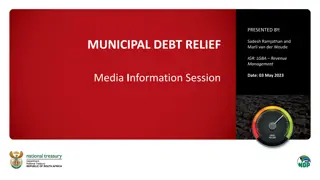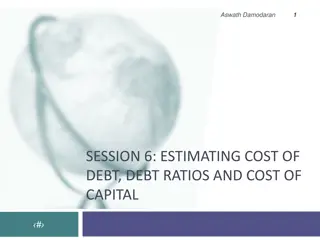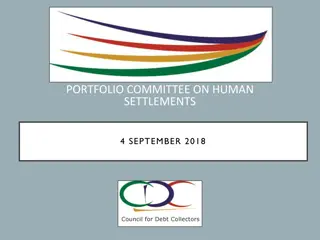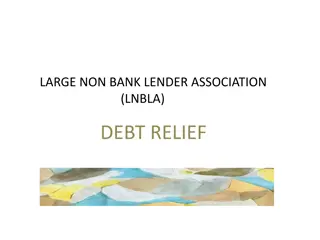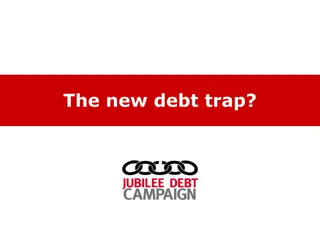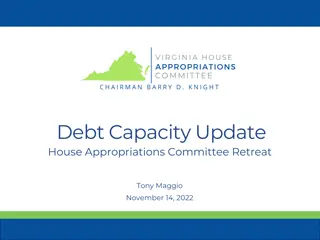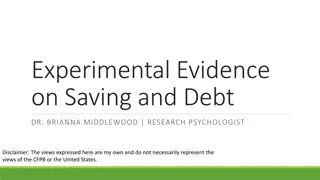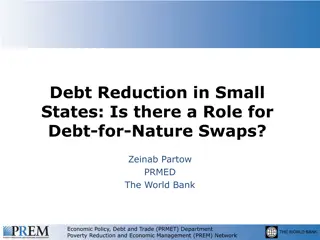
Debt Vultures and Protecting Your Finances
Learn how to identify debt vultures, businesses that take advantage of individuals in financial distress, offering costly and inappropriate debt solutions. Discover the risks associated with credit repair, debt negotiation, and alternative services while advocating for consumer protection and financial well-being.
Download Presentation

Please find below an Image/Link to download the presentation.
The content on the website is provided AS IS for your information and personal use only. It may not be sold, licensed, or shared on other websites without obtaining consent from the author. If you encounter any issues during the download, it is possible that the publisher has removed the file from their server.
You are allowed to download the files provided on this website for personal or commercial use, subject to the condition that they are used lawfully. All files are the property of their respective owners.
The content on the website is provided AS IS for your information and personal use only. It may not be sold, licensed, or shared on other websites without obtaining consent from the author.
E N D
Presentation Transcript
Debt Vultures Cat Newton Policy Officer Lachlan Edwards Solicitor 30 March 2017 Consumer Action Law Centre www.consumeraction.org.au
Learning Outcomes 1. How you can spot a debt vulture 2. How you can help your clients 3. How you can advocate for change
Session overview 1. Spotting a debt vulture 2. Case study 1 credit repair 3. Case study 2 debt negotiator 4. Case study 3 debt agreement 5. Advocating for change
Bad credit? Money worries keeping you up at night? Defaults? Clean your credit history! Live debt free! Call us to enquire about debt relief Take back control! Call now for a free consultation!
Spotting a debt vulture Debt vultures (aka debt management firms) are businesses preying on people in financial difficulty by selling high cost, low value or inappropriate debt solutions Credit repair Debt negotiation Debt agreements Budgeting services Other for-profit services targeted at people with money, debt, credit or creditworthiness problems
Whats the problem? Bad advice Unsuitable options Poor understanding of the law and consequences Conflicted advice Fees Opaque High Upfront High pressure sales tactics Rarely refer to the free options FCs and consumer lawyers Ombudsman schemes No uniform regulatory framework
Credit Repair What do they do? Promise to fix or clean your credit report Problems High upfront fees for services that could be accessed for free Misleading promises about what they can achieve Not required to be licensed, qualified, or a member of an ombudsman scheme
Debt Negotiators What do they do? Negotiate settlements of debts with creditors Problems High fees High risk strategies Advice without regard to overall financial situation Not required to be licensed, qualified, or a member of an ombudsman scheme
Debt Agreements What do they do? Arrange or administer debt agreements (a form of personal insolvency) Problems Suggest debt agreement as best/only option Downplay consequences Non-refundable and hidden fees Limited regulation of administrators Not required to be a member of a free ombudsman scheme
Budgeting / Money Management What do they do? Income redirected to company, which gives client a living allowance and pays bills / debts Problems Upfront fee plus periodic fees Unsustainable or unsuitable budgets Pay themselves before creditors, keep interest No responsibility for defaults Not required to be licensed, qualified, or a member of an ombudsman scheme
Case study 1: Credit repair Mick and Saul want to buy their first home. Mick s not working at the moment but has some money from his late grandparents to put towards a deposit. Big Bank refuse their mortgage application. Mick remembers a letter from Phone Co a few years ago about an unpaid bill and something about a credit listing. He searches credit report online, and the top link takes him to Credit Miracle Co s website. During his free telephone consultation, the friendly consultant says that Credit Miracle should be able to fix his credit report but will need to check. She calls back an hour later with goods news they can help! If he pays just $1000 today, they can clear up his credit report, and help him on the way to buying a home. They read out some T&Cs. Mick agrees and gave his credit card details.
Case study 1: Credit repair Weeks later, Credit Miracle send a bundle of documents including a form to request his credit report and a guide to challenging listings. Mick s credit report shows a default listing in April 2012 by Phone Co for $480. Credit Miracle tells Mick to call Phone Co and apply to the Telecommunications Industry Ombudsman (TIO). Mick wonders why he s doing all the work. The TIO decides against Mick, finding that the credit listing was validly made by Phone Co. Mick demands a refund from Credit Miracle. The friendly consultant refuses, pointing to clauses in the T&Cs: a) Credit Miracle does not make any representation or promise to rectify your credit report. b) Our services means a report on your credit worthiness and information on how to challenge an incorrect listing.
Case study 1: Credit repair Questions 1. What problems do you see with Credit Miracle s conduct? 2. What are Mick s legal options?
Case study 1: Credit repair Summary 1. Misleading and deceptive conduct (section 18 Australian Consumer Law) 2. Unconscionable conduct (section 21 Australian Consumer Law) 3. Guarantee that services be reasonably fit for purpose (section 61 Australian Consumer Law)
Case study 2: Debt negotiator Alan and Anna are married. They own their home mortgaged to Big Bank. Alan works earning a low income and Anna receives a pension. Because of difficulty, they fall behind on their loan to Big Bank, who sues them for possession of their home. At the same time, they receive numerous flyers in the mail offering to help them repossession. Desperate to save their home, they call one of the flyer companies, Home Saver, who offer to help refinance their debts to save their home. save their home from
Case study 2: Debt negotiator Home Saver say that Alan and Anna need to urgently speak with another company, Helpers, who can buy them more time so Home Saver can arrange the refinance. Alan and Anna sign an agreement with Helpers to stay the repossession by 60 days, for a fee of almost $4,000. This agreement was not explained to them, but they were pressured to sign in a rush. Helpers then lodge a caveat on the title of their property. Without telling Alan and Anna, to halt the repossession, Helpers make a complaint to an Ombudsman service, something Alan and Anna could have done themselves for free. Helpers do not talk to them about this and do not respond to the Ombudsman when it asks for details about the case.
Case study 2: Debt negotiator Alan and Anna hear nothing until Home Savers contact them saying that to help with they refinance, they must urgently sign two more agreements with Helpers, one to clean their credit report and another to negotiate to reduce their unsecured debts. Each contain fees of between $2,000 and $4,000. Hearing nothing from Home Savers for some time, Alan and Anna receive a notice to vacate their home from the sheriff. They then receive a bill for $12,000 from Helpers, who refer the debt to Debt Collectors. Panicked, Alan and Anna find their own way to save their home that does not involve Helpers or Home Saver.
Case study 2: Debt negotiator Questions 1. What issues do you see with Home Saver and Helper s conduct? 2. What Alan and Anna s options?
Case study 2: Debt negotiator Summary 1. Guarantee of due care and skill (section 60 Australian Consumer Law) 2. Guarantee that services be reasonably fit for purpose (section 61 Australian Consumer Law) 3. Unconscionable conduct (section 21 Australian Consumer Law) 4. Unfair contract term (section 23 Australian Consumer Law)
Case study 3: Debt agreements Lisa works as a carer, earning approximately $1,400 per fortnight. Lisa is 64 and likely to retire soon. She lives in a 40 year old caravan and owns a car worth $900. Lisa owes around $30,000 in credit card debt to two creditors. Worried about her debts, Lisa called Debt Co after seeing an ad on TV promising that Debt Co 'would stop all interest and make it easier to pay.' As a result of the call, a man came to her home on the same day. He was only there for about half an hour. He said that if Lisa paid $1800, Debt Co would negotiate with her creditors to stop interest and that she would be able to make payments to pay off the debts. He didn t say how much the payments would be, and didn t mention any fees.
Case study 3: Debt agreements Debt Co did not mention any of Lisa's other options to manage her debts, like hardship, informal negotiations or bankruptcy. Lisa signed an agreement with Debt Co's and had to pay $300 per fortnight towards an $1,800 fee for its service. Debt Co then provided her with a pre-filled debt agreement proposal. Under the proposal, Lisa would repay $21,569 to her unsecured creditors and pay Debt Co fees totalling $7,930. The debt agreement proposal states that Lisa's uncommitted income is $244 per fortnight. Despite this, Debt Co's fee for preparing the proposal was $300 per fortnight putting her budget into deficit for 5 consecutive fortnights before she even repays her creditors. Lisa did not sign the proposal and saw a financial counsellor.
Case study 3: Debt agreements Questions 1. What problems do you see with Debt Co s conduct? 2. What are Lisa s options?
Case study 3: Debt agreements Summary 1. Guarantee of due care and skill (section 60, Australian Consumer Law) 2. Guarantee that services be reasonably fit for purpose (section 61, Australian Consumer Law)
Summary: Legal options 1. Negotiate with trader 2. Industry ombudsman scheme (some traders are members) 3. Tribunal or Court 4. Complain to the regulator
What needs to change? Seamless regulatory framework for all debt management firms Licensing by ASIC Compulsory membership of industry ombudsman scheme Meet conduct standards, such as a requirement to act in their client s best interest Better regulation of debt agreements What other changes would help your clients?
Advocating for change Case studies Recording a client s story Media Visit local MP with your client Complain to the regulator Stay in touch!
Questions? Debt Vultures
Session review You can now spot a debt vulture Your clients have legal options You and your clients are important in advocating for change Stay in touch with our campaign
Stay in touch Consumer Action Law Centre Level 6, 179 Queen Street Melbourne VIC 3000 www.consumeraction.org.au Cat Newton Policy Officer 03 9670 5088 cat@consumeraction.org.au


